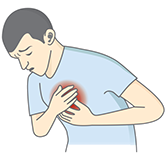EMERGENCY RESPONSE WEB APP
The cause of chest pain varies from minor problems to potentially fatal ailments. The specific cause can be difficult to determine.
If the person
Commence CPR if the person becomes unresponsive and stops breathing.
For the person providing first aid, it's not important to know the cause of the chest pain. The person providing the first aid needs to determine if the condition requires immediate attention or if it can be delayed until the person sees their doctor.

If, in addition to the chest pain, the persons exhibits one or more of the following:
When in doubt, assume that emergency medical attention is required.
In these cases, it is best to monitor for awhile to make sure more severe symptoms don't appear then advise the person to call their doctor while you are there. Stand by far enough away that the person can speak privately while you still can view if the person's condition worsens.